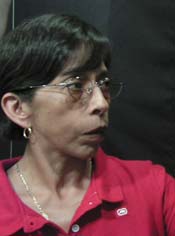New York, April 30, 2012–Authorities must immediately investigate the murder of Mexican journalist Regina Martínez Pérez, determine the motive, and ensure the perpetrators are brought to justice, the Committee to Protect Journalists said today.
The body of Martínez was found in her home on Saturday evening in Xalapa, the capital of the Gulf Coast state of Veracruz, according to news reports. She had been badly beaten around the face and ribs and had been strangled to death, news reports said. The state attorney general, Amadeo Flores Espinoza, said in a news briefing that it appeared her TV, cellphones, and computer had been stolen.
Martínez had worked for the national magazine Proceso for more than 10 years and was known for her in-depth reporting on drug cartels and the links between organized crime and government officials. In the week before her murder, she covered the arrest of an allegedly high-ranking leader of the Zetas; the arrests of nine police officers charged with working for a cartel; and the story of a local mayor who was arrested with other alleged cartel gunmen after a shootout with the Mexican Army, according to news reports.
“Regina would always write about one-third more of the real truth than I dared to do in any story we covered. And I write more than most reporters,” a journalist from Xalapa, who asked to remain anonymous for his safety, told CPJ. Martínez’ colleagues said she had not told them about any threats prior to her death.
The office of the state governor, Javier Duarte de Ochoa, said he had ordered a special group of agents to investigate the murder. Proceso stated on its website that the state government had granted the magazine staff access to any information resulting from the investigation. The magazine also said that its executives had told the governor on Sunday that they were skeptical that the investigation would succeed because of the systemic dysfunction in the country.
“We condemn the brutal murder of Regina Martínez Pérez,” said Carlos Lauría, CPJ’s senior program coordinator for the Americas. “Mexican authorities must break the deadly cycle of impunity in crimes against the press by fully investigating this murder and bringing those responsible to justice.”
The federal attorney general’s office said it would closely monitor the investigation to decide if federal laws had been violated in the murder and whether federal authorities should take over the case. News accounts have reported that both the state and federal human rights commissions are joining the investigation.
In March, the Mexican Senate approved a long-discussed constitutional amendment that, if passed by a majority of states, would federalize anti-press crimes and transfer investigative powers to national authorities. Ten of 17 state legislatures have passed the bill so far, according to the local press freedom organization Fundalex.
Veracruz, where four journalists were murdered in 2011, is one of Mexico’s most dangerous states for the press, according to CPJ research. The state is a battleground for two organized crime cartels, the Zetas and the Sinaloa, CPJ research shows. Journalists say there is widespread corruption in local government, and in recent months there has been an escalation in violence.
Since 2006, more than 40 journalists have been killed or disappeared in Mexico, according to CPJ research. Due to a mixture of negligence and pervasive corruption among law enforcement officials, particularly at the state level, crimes against the Mexican press are almost entirely unsolved, CPJ research shows. Mexico appeared in 8th place in CPJ’s 2012 Impunity Index, which spotlights countries where journalists are slain and their killers go free.
- For more data and analysis on Mexico, visit CPJ’s Attacks on the Press.
